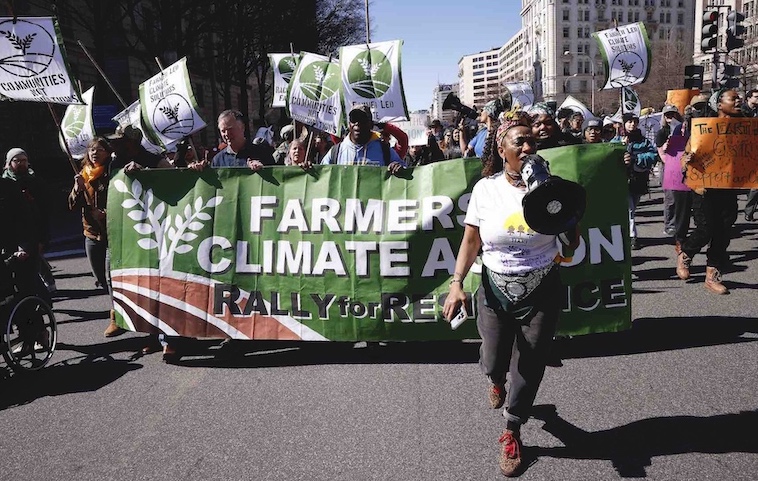
Guest Essay: Farmers Rally at Nation's Capitol for Climate Resilience
Michael Guebert (the tall guy on the left, above), who with his wife Linda owns Terra Farma, a multi-species sustainable farm in Corbett, Oregon, went to Washington, DC, last week to lobby Oregon's congressional delegation and participate in a rally called "Farmers for Climate Action: Rally for Resilience." Guebert is a full-time farmer, an elected member of the Board of Directors at the East Multnomah Soil & Water Conservation District (EMSWCD), a farm mentor for the Food Animal Concerns Trust (FACT) and an advocate for better state and national policies regarding agriculture. Here is his report:
Let’s start with a simple one-question quiz: Can you name the #1 export from American soil in terms of tons per acre?
You might guess corn, soy, beef, wheat or a myriad of other products, but, in fact, the number one export from American soil is just that—topsoil. Across the nation, our farmland loses an average of over five tons of topsoil per acre every year, and with that, carbon that has been sequestered for generations is lost to the atmosphere and its potential to store carbon in the future could be permanently compromised. The impact from soil disturbance and erosion is a significantly under-reported driver of climate change, but also represents an opportunity. Our ecological systems are resilient, to a point, but the time to act is now, before we meet the proverbial point of no return.
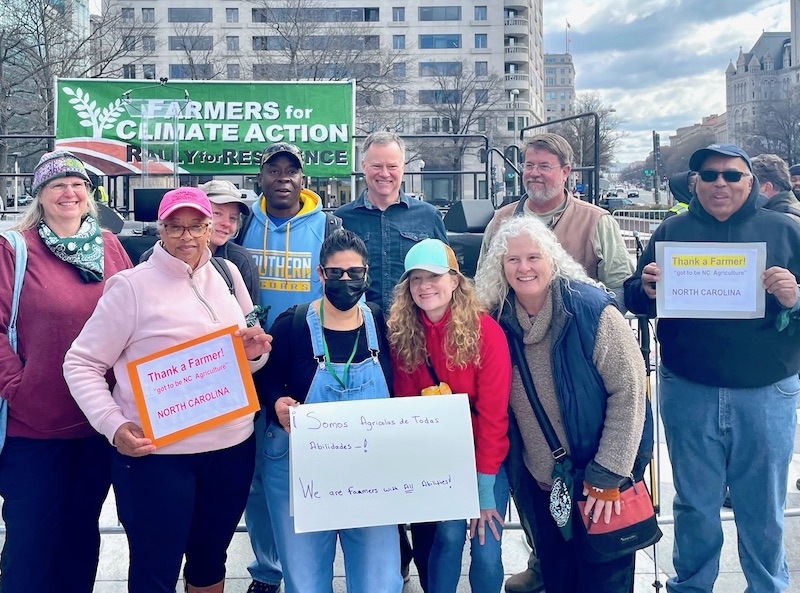
So, in that spirit of resilience, on March 7th and 8th a broad coalition of farmers from across the country converged on Washington, DC, for the “Farmers for Climate Action: Rally for Resilience” and I was honored to be selected to attend. After last year’s Farm Aid concert, board members Willie Nelson, Dave Matthews, John Mellencamp, and Margo Price came up with an idea to recreate the famous tractorcade of 1979 when thousands of farmers from across the country drove their tractors to the nation's capital in the hopes of bringing change to agricultural policy.
In 2023, clogging the streets with farm equipment would be impractical, so Farm Aid worked with the National Sustainable Agriculture Coalition (NSAC) to bring together all their affiliates and the farmers they work with for a rally and meetings with their senators and representatives. I applied for one of the handful of slots and found out last month that I was selected, and I was so excited for the opportunity, as well as my first-ever trip to Washington, DC.
Can you name the #1 export from American soil in terms of tons per acre?
This year is particularly critical because the farm bill is reauthorized every five years. A new farm bill will be passed before the end of this year, so dozens of similar groups from around the country brought hundreds of farmers to lobby for a farm bill that would reallocate money that is currently going to destructive industrial agricultural practices to instead go to policies that prioritize family farms, climate-friendly practices, and producers that have been socially or economically excluded from previous farm bill benefits.
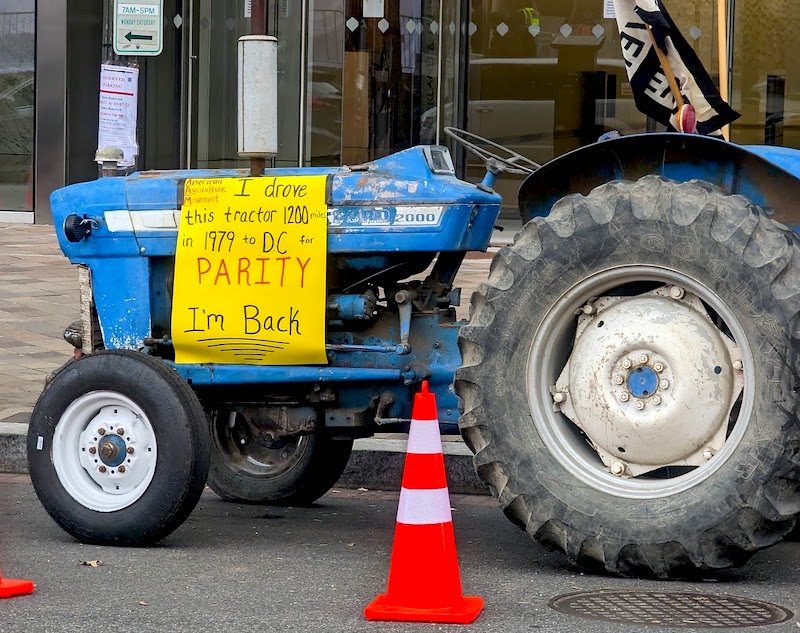
The events began with a rally just east of the White House at Freedom Plaza where we listened to a speech by one of the organizers of that original tractorcade. (He even brought the tractor he drove here from Texas in 1979!) We also heard many touching stories of the struggles faced by so many in our farm community, like Marielena Vega, a farm worker in Idaho who described the plight of her family and community in the face of low pay, substandard living and working conditions, lack of health care and zero paid leave of any kind. Farm workers have almost always been excluded from policy considerations; it’s time for that to change.
Interspersed with speeches and the moderation of Ray Jeffers, a Black farmer turned newly elected member of the North Carolina legislature, the rally was highlighted by a video link of Willie Nelson and an in-person performance from John Mellencamp. We then took to the streets and, with a police escort, marched the mile-plus to the capital, ending at the front steps of the Supreme Court.
Farm workers have almost always been excluded from policy considerations;
it’s time for that to change.
After training by NSAC on how to conduct our scheduled meetings with our congresspeople, we had the remainder of the evening to strategize and refine our message. While I was the only FACT representative from Oregon, I was able to meet up with two other Oregon farmers, Bashira Muhammad of Zoom Out! Mycology in Springfield and Willow from Valhalla Serenity Homestead near Klamath Falls. They were part of a small contingent from the Black farmers of Oregon (and Washington), but since they didn’t have a chance to get any meetings scheduled, I invited them to join me in my meetings in the offices of Jeff Merkley, Ron Wyden, and Earl Blumenauer.
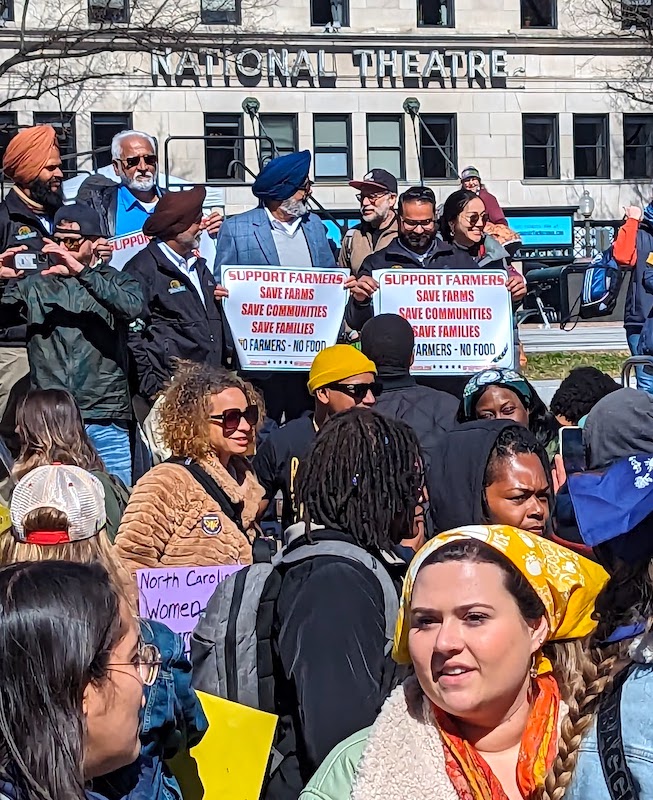
In each of the 30-minute meetings we introduced ourselves, reassuring them that we were actual farmers—they seemed to genuinely appreciate seeing actual constituents compared to the typical lobbyists they see day in and day out. We moved on to discuss the challenges farmers face from a changing climate, wildfires, competition from unsustainable industrial ag, and policies that leave out funding for smaller farms like ours.
They seemed especially concerned when I described how we had to give up selling raw milk at Terra Farma because drought, due in part to climate change, has caused the price we pay for hay to double in less than two years. Plus the fact that we had our liability insurance cancelled because we sold raw milk (which is completely legal for us to sell).
Then we moved on to our specific asks: The overarching priority from NSAC is the Agricultural Resilience Act, which focuses on farmer-led climate solutions, racial justice, and communities, not corporations. Two priorities from FACT were the Grazing Lands Conservation Initiative, which would provide funding to support pasture-based systems like those we use at our farm, and the Strengthening Local Processing Act, to address the critical need for animal processing for independent small farms.
I planted the seed for support for a crazy idea that I have:
that Oregon should have its own farm bill.
I also added some of my personal priorities to support the work I do at EMSWCD, like increased funding for easements to protect farmland and dollars to support more urban agriculture. Finally, I planted the seed for support for a crazy idea that I have: that Oregon should have its own farm bill, and the federal farm bill should have funding for any state that wants to create something that is more specific to that state’s needs.
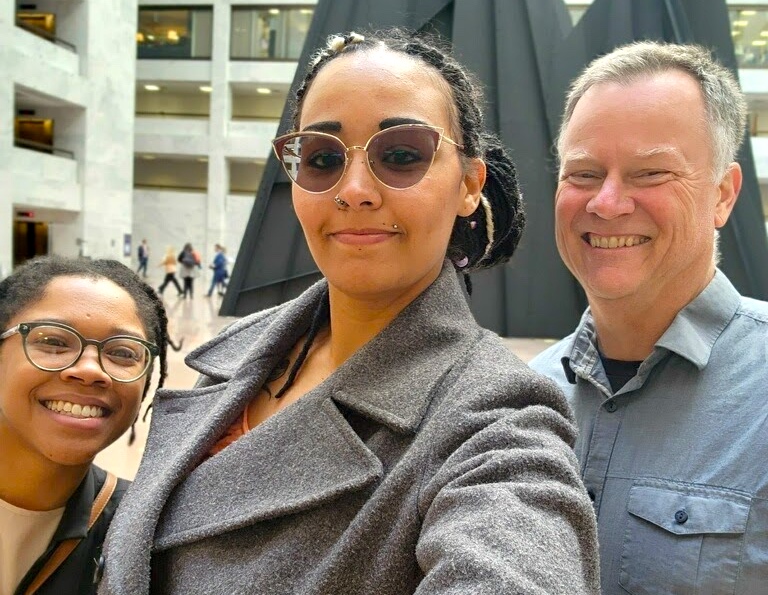
Fortunately, my job in these meetings was easy, as we are incredibly lucky to have the delegation we do here in Oregon; all three of them “get it” and, in fact, they brought up questions about some of the above-mentioned priorities even before I did. I left each of the meetings feeling very positive, though tempering my expectations because I know the reality of federal policy is that change is often incremental and slow. Some of the things we are asking for might not see progress until the next farm bill or two to be fully implemented—but if we don’t ask, the answer will always be no.
I closed each of the meetings with a sentiment I’ve been thinking about quite a bit lately: Farming is a public service. But, unlike many other public servants who have job security, a middle-class paycheck, health care, paid vacation and paid sick leave; farmers have none of these things. Additionally, they are burdened with locating and maintaining land that is increasingly out of financial reach for most new farmers. So, even though we are an essential part of every human’s existence, we are burdened with all the risk of providing that sustenance.
Please join me in the effort to not only help climate-friendly agriculture survive, but to thrive. Not everyone is able to go to DC or the state capital to meet with their elected officials, but emails and phone calls are effective. More importantly, though, supporting farms that are employing these practices can do more than just keep a local business afloat. Their success will inspire others to follow in their footsteps, and building this movement from the ground up will undoubtedly affect future policy.
TAKE ACTION: The Agriculture Resilience Act offers a roadmap for supporting the transition to sustainable and climate-friendly food and agriculture systems, while setting amibitious yet realistic goals for agriculture to be part of the solution to the climate crisis. Take action today by asking your Members of Congress to cosponsor the bill!
UPDATE: Yesterday the president released his proposal for ag spending for fiscal year 24, and while it increases discretionary funding for the USDA and the Conservation Technical Assistance (CTA) program mentioned above, the Grazing Lands Conservation Initiative that I wrote about in my story had its funding go from $14 million to zero. This underscores the need for lawmakers to hear from their constituents about the importance of this initiative and to push for a funding level of $50 million per year. Read the NSAC press release. And consider taking action today by asking your Members of Congress to cosponsor the bill.
All photos courtesy Michael Guebert.
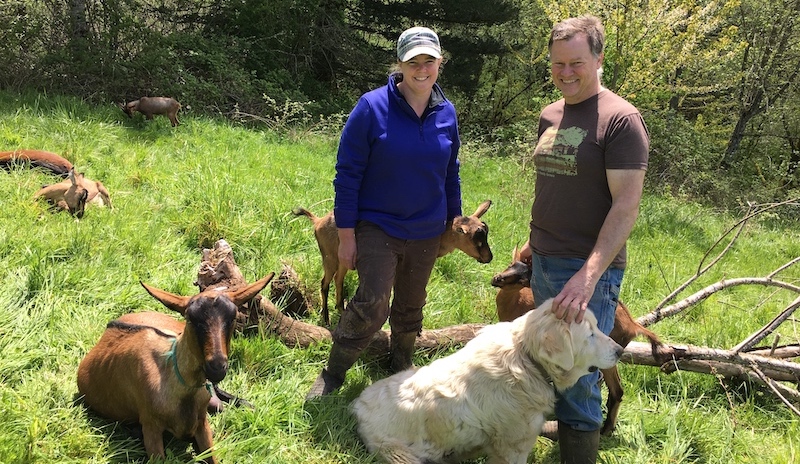
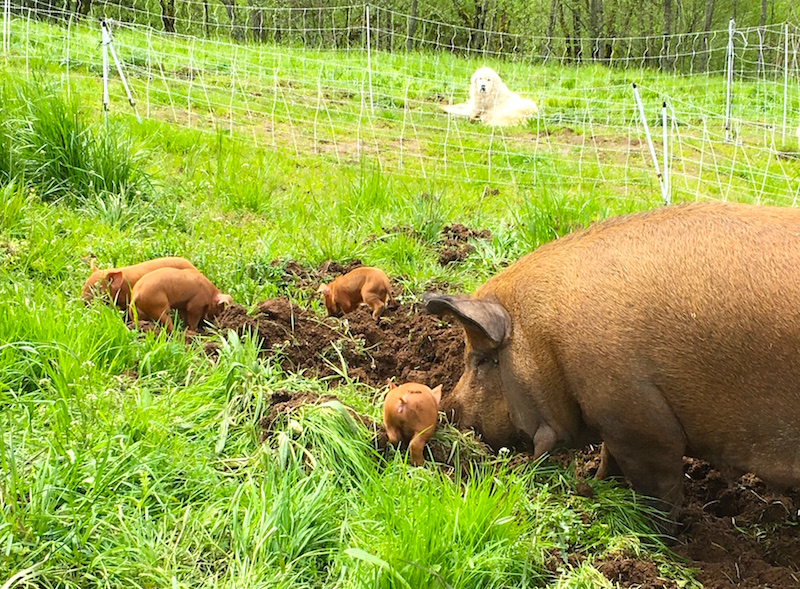 In the spring of 2020 they're taking
In the spring of 2020 they're taking  Goats were added, initially raised for their meat, but after milking a couple of their does, the Gueberts decided to focus on dairy, finding a ready market for their
Goats were added, initially raised for their meat, but after milking a couple of their does, the Gueberts decided to focus on dairy, finding a ready market for their 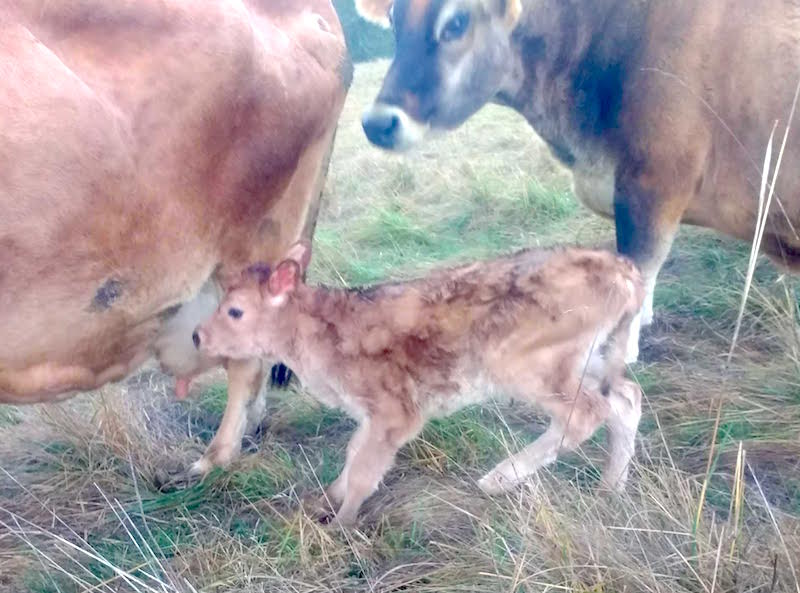 There's also, of course, the financial aspect. The farm currently has a steady income from the milk and meat they raise, with a loyal client base built up over many years. Customers come out to the farm in Corbett to pick up orders, and the online ordering and billing system the Gueberts implemented has streamlined transactions. Linda was able to leave her job to work on the farm full time in 2011, but like many farm couples, Mike still has a full-time job off the farm that helps pay the mortgage.
There's also, of course, the financial aspect. The farm currently has a steady income from the milk and meat they raise, with a loyal client base built up over many years. Customers come out to the farm in Corbett to pick up orders, and the online ordering and billing system the Gueberts implemented has streamlined transactions. Linda was able to leave her job to work on the farm full time in 2011, but like many farm couples, Mike still has a full-time job off the farm that helps pay the mortgage.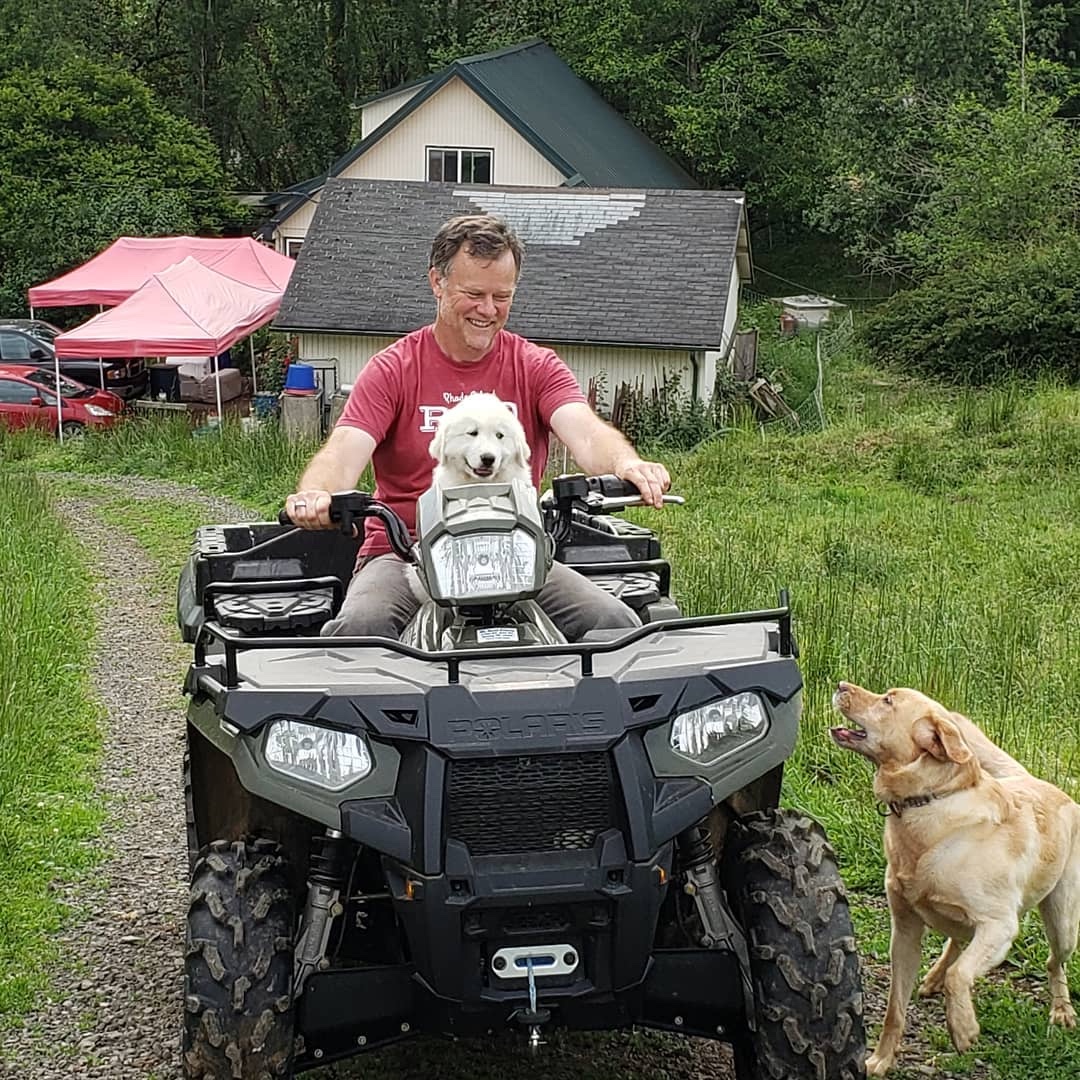 The plan for the meat CSA, still undergoing some fine-tuning, is to offer quarterly subscriptions in the $325 price range for a 10- to 12-pound monthly box of a variety of cuts and kinds of meat (i.e. pork, beef or chicken). Customers won't get the same box every month, ensuring that selection is varied and the whole animals will be used.
The plan for the meat CSA, still undergoing some fine-tuning, is to offer quarterly subscriptions in the $325 price range for a 10- to 12-pound monthly box of a variety of cuts and kinds of meat (i.e. pork, beef or chicken). Customers won't get the same box every month, ensuring that selection is varied and the whole animals will be used.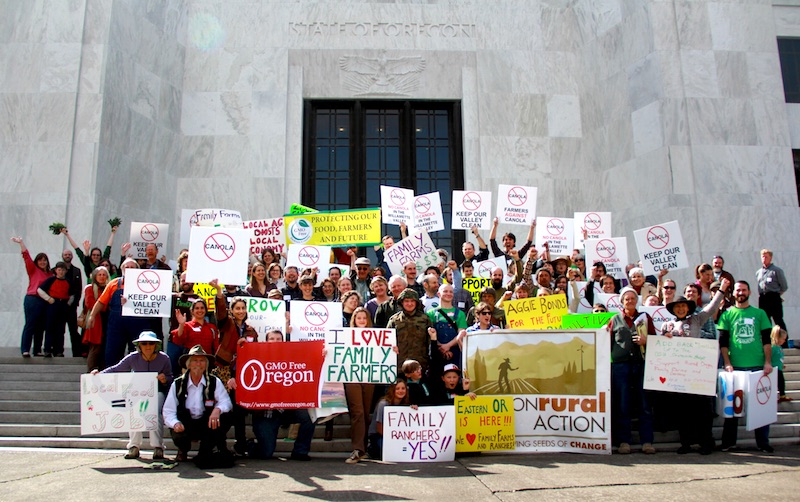
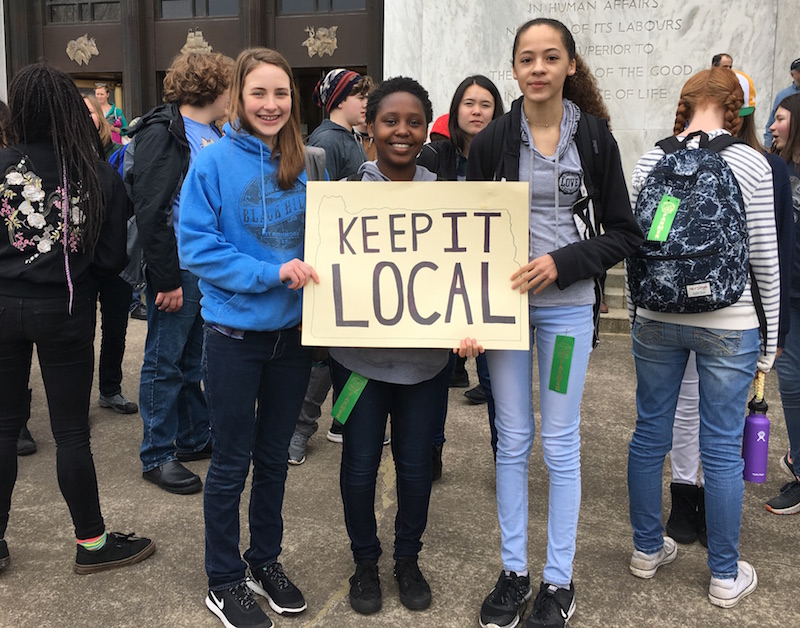 Showing up, and learning the power of collectively putting our bodies where our beliefs are, has meant that from local school boards to state legislatures to the halls of Congress, our representatives are now more…well…representative of everyone in our communities.
Showing up, and learning the power of collectively putting our bodies where our beliefs are, has meant that from local school boards to state legislatures to the halls of Congress, our representatives are now more…well…representative of everyone in our communities.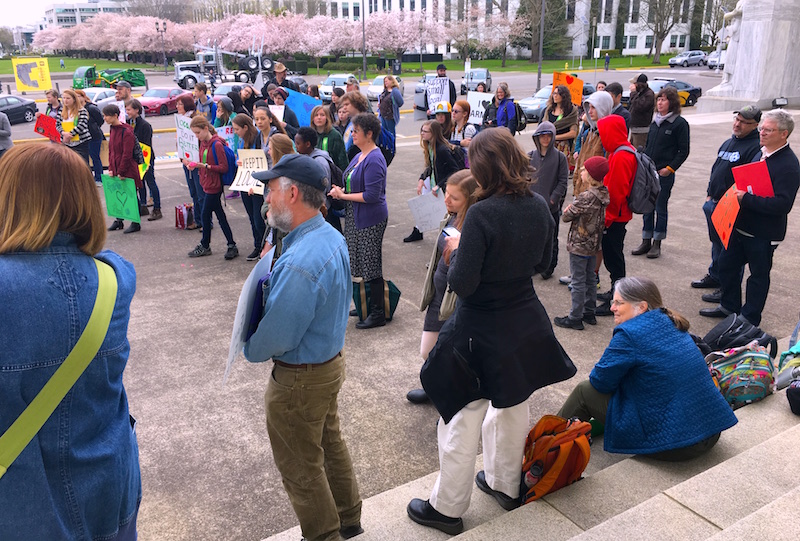 If you're wondering what the heck the legislature has to do with your food, just take a glance at
If you're wondering what the heck the legislature has to do with your food, just take a glance at